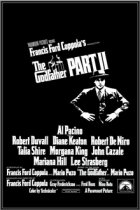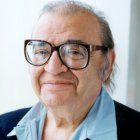
The Godfather: Part II Page #9
SIG. ABBANDANDO
Vitone...I...Fanucci has a nephew.
Vito looks at him a while, as the old man struggles to tell
him.
VITO:
(Sicilian)
And you must give him my job.
The old man nods, regretfully.
VITO:
(Sicilian)
You have been kind to me since I
was a boy; taken care of me, and
been as a father. I will always be
grateful to you. Thank you.
Vito takes off his apron, and leaves, passing the youth who
loiters by the counter.
EXT. THE STREET - DAY
making his way from the store.
SIG. ABBANDANDO
(Sicilian o.s.)
Vitone!
He turns, and Abbandando has followed him out of the shop,
holding a basket of some groceries.
SIG. ABBANDANDO
Here...for your family.
VITO:
No...please understand...I cannot
accept.
INT. VITO'S TENEMENT - MED. VIEW - NIGHT
Vito and his wife sit quietly at the table; the two are
quiet and sad.
Suddenly, we HEAR a noise, and Vito is astonished to see a
young man, PETER CLEMENZA, leaning out of the window on the
other side of the air shaft which separates their apartments.
CLEMENZA:
Hey Paisan! Hold this for me until
I ask for it. Hurry up!
Automatically Vito reaches over to the empty space at the
air shaft, and takes the bundle of rags. Clemenza's round
face is strained and urgent, obviously in some kind of
trouble. Suddenly, he closes the window and there is
activity that we cannot see in the other apartment.
Vito looks to his wife, and then closes the window and
window dressing and takes the bundle into a private part of
his kitchen and begins to unwrap it.
WHAT HE SEES:
Five oily guns. He immediately wraps them again, and
carries them to a private closet, and hides it, and returns
to his wife. He sits down back at the table; and she knows
not to ask him what has happened.
EXT. NEW YORK STREETS - DAY
Vito is walking through the crowded streets with a group of
workmen; they all wear work clothes, and paper hats on their
heads.
Vito looks to his left, and realizes that Clemenza is
walking silently with him; by contrast, Clemenza dresses well.
CLEMENZA:
(Sicilian)
(casually)
Do you have my goods still?
Vito nods.
CLEMENZA:
(Sicilian)
Did you look inside?
Vito, his face impassive, shakes his head 'no.'
CLEMENZA:
(Sicilian)
I'm not interested in things that
don't concern me.
INT. DOWNTOWN ITALIAN SOCIAL CLUB - DAY
Vito and Clemenza drinking wine; they've become friends.
CLEMENZA:
(Sicilian)
I have a friend who has a fine rug.
Maybe your wife would like it.
VITO:
(Sicilian)
We have no money for a rug.
CLEMENZA:
(Sicilian)
No. He would give it away. I know
how to repay a consideration.
Vito thinks, then nods.
VITO:
(Sicilian)
She would like it.
INT. HALLWAY WEALTHY APARTMENT BUILDING - DAY
The two men proceed up the hallway; Vito is impressed with
the opulence.
VITO:
(Sicilian)
Your friend lives in a fine building.
CLEMENZA:
(Sicilian)
Oh yes, the very best.
Clemenza knocks on the door as though he is well known here;
then rings. No answer.
CLEMENZA:
(Sicilian)
Ah, he's not at home. Oh, well, he
wouldn't mind.
Quickly and expertly he takes out a tool and pries open the
door.
INT. WEALTHY APARTMENT - FULL VIEW - DAY
Vito looks in awe at the luxurious apartment, which features
a fabulous rich red wool rug.
Clemenza immediately moves some of the furniture away, and
drops to the floor.
CLEMENZA:
A little help.
Vito joins him, and the two begin rolling the rug. We HEAR
a BUZZER RING. Clemenza immediately drops his side of the
roll, and moves to the window. He pulls a gun from his
jacket.
VIEW ON Vito watching. He moves so he can see out the window.
THEIR VIEW:
A Policeman stands at the exterior door, waiting. He rings
the buzzer again.
VIEW ON CLEMENZA
cocking his gun. Vito realizes that if the Policeman should
pursue it any further he is a dead man. The Policeman gives
up and leaves.
Clemenza puts away his gun.
INT. VITO'S TENEMENT HALLWAY - DAY
The two men run up the steps, laughing, carrying the fine rug.
INT. VITO'S TENEMENT - DAY
They are on their knees cutting the rug to fit the small
room. Carmella watches, holding the baby SANTINO.
Like a professional, cutting quickly, with the proper tools.
He sings as he works.
DISSOLVE TO:
EXT. DOWNTOWN WAREHOUSE - NIGHT
Clemenza knocks on the steel door of this downtown building.
Vito waits with him, holding some packages; and another
youth, TESSIO, tall and thin and deadly waits with them.
The door is lifted, and they are greeted by a bright,
middle-aged Italian named AUGUSTINO who leads them into a
machine shop.
INT. MACHINE SHOP - NIGHT
CLEMENZA:
(Sicilian)
Good, you waited for us.
Clemenza looks up on a higher level.
HIS VIEW:
There is a nine year old boy, operating a drill press.
MED. VIEW
TESSIO:
(Sicilian)
Who is he?
AUGUSTINO:
(Sicilian)
My son, Carmine...it's all right.
The men then quickly open the packages they've brought;
revealing gun, including a more sophisticated machine weapon.
Augustino takes them and expertly begins to clean and
prepare them.
CLEMENZA:
(Sicilian)
(to Vito)
Paisan Augustino was a gunsmith in
the Italian army. We do each other
favors.
AUGUSTINO:
(Sicilian)
(while he works)
My boy is studying the flute. He
plays very well. He helps me at
night so we can buy him a silver
flute someday. Now he has one made
of wood. Carmine...play...play for
my friends.
VIEW ON THE BOY:
wide-eyed... he shuts off the press; and takes out a shabby
wooden flute. And begins to play a simple and pure melody.
CLOSE ON VITO:
listening.
CLOSE ON AUGUSTINO
proudly smiling, as he prepares the machine gun.
CLOSE ON TESSIO:
listening, smiling.
FULL VIEW:
The men listening, as the boy's father prepares their guns.
Tessio and Clemenza quickly load racks of cheap dresses.
Vito sits behind the wheel of the truck. He seems reserved,
and we get the impression that he is studying every move his
two friends are making.
INT. TENEMENT STAIRS - DAY
Clemenza runs up a flight of stairs with an armful of
dresses. He knocks on a door, and a pretty HOUSEWIFE answers.
CLEMENZA:
(Sicilian)
Lady, I got a bargain on these
dresses. Five dollars each. You
gotta pay at least fifteen, maybe
twenty in a store. Look at them,
first class.
He holds the dresses up and the woman seems interested. She
handles a couple of them and stands aside so Clemenza can
enter her apartment.
WOMAN:
(Sicilian)
I don't know which one I like best.
She holds the dresses against her body, Clemenza approving
of each one; and then she goes to her purse and takes out
five singles and gives them to him.
CLEMENZA:
(Sicilian)
You'd look beautiful in all of
these. You should buy at least two.
WOMAN:
(Sicilian)
Are you kidding? My husband will
kill me if he knows I paid five
dollars for one dress.
She holds one up, then another. She is torn. Clemenza
shakes his head and straightens the dress on her body. His
hand brushes her arm; she looks at him smiling.
CLEMENZA:
(Sicilian)
You can have two for five.
She smiles back.
Translation
Translate and read this script in other languages:
Select another language:
- - Select -
- 简体中文 (Chinese - Simplified)
- 繁體中文 (Chinese - Traditional)
- Español (Spanish)
- Esperanto (Esperanto)
- 日本語 (Japanese)
- Português (Portuguese)
- Deutsch (German)
- العربية (Arabic)
- Français (French)
- Русский (Russian)
- ಕನ್ನಡ (Kannada)
- 한국어 (Korean)
- עברית (Hebrew)
- Gaeilge (Irish)
- Українська (Ukrainian)
- اردو (Urdu)
- Magyar (Hungarian)
- मानक हिन्दी (Hindi)
- Indonesia (Indonesian)
- Italiano (Italian)
- தமிழ் (Tamil)
- Türkçe (Turkish)
- తెలుగు (Telugu)
- ภาษาไทย (Thai)
- Tiếng Việt (Vietnamese)
- Čeština (Czech)
- Polski (Polish)
- Bahasa Indonesia (Indonesian)
- Românește (Romanian)
- Nederlands (Dutch)
- Ελληνικά (Greek)
- Latinum (Latin)
- Svenska (Swedish)
- Dansk (Danish)
- Suomi (Finnish)
- فارسی (Persian)
- ייִדיש (Yiddish)
- հայերեն (Armenian)
- Norsk (Norwegian)
- English (English)
Citation
Use the citation below to add this screenplay to your bibliography:
Style:MLAChicagoAPA
"The Godfather: Part II" Scripts.com. STANDS4 LLC, 2025. Web. 23 Feb. 2025. <https://www.scripts.com/script/the_godfather:_part_ii_101>.







Discuss this script with the community:
Report Comment
We're doing our best to make sure our content is useful, accurate and safe.
If by any chance you spot an inappropriate comment while navigating through our website please use this form to let us know, and we'll take care of it shortly.
Attachment
You need to be logged in to favorite.
Log In